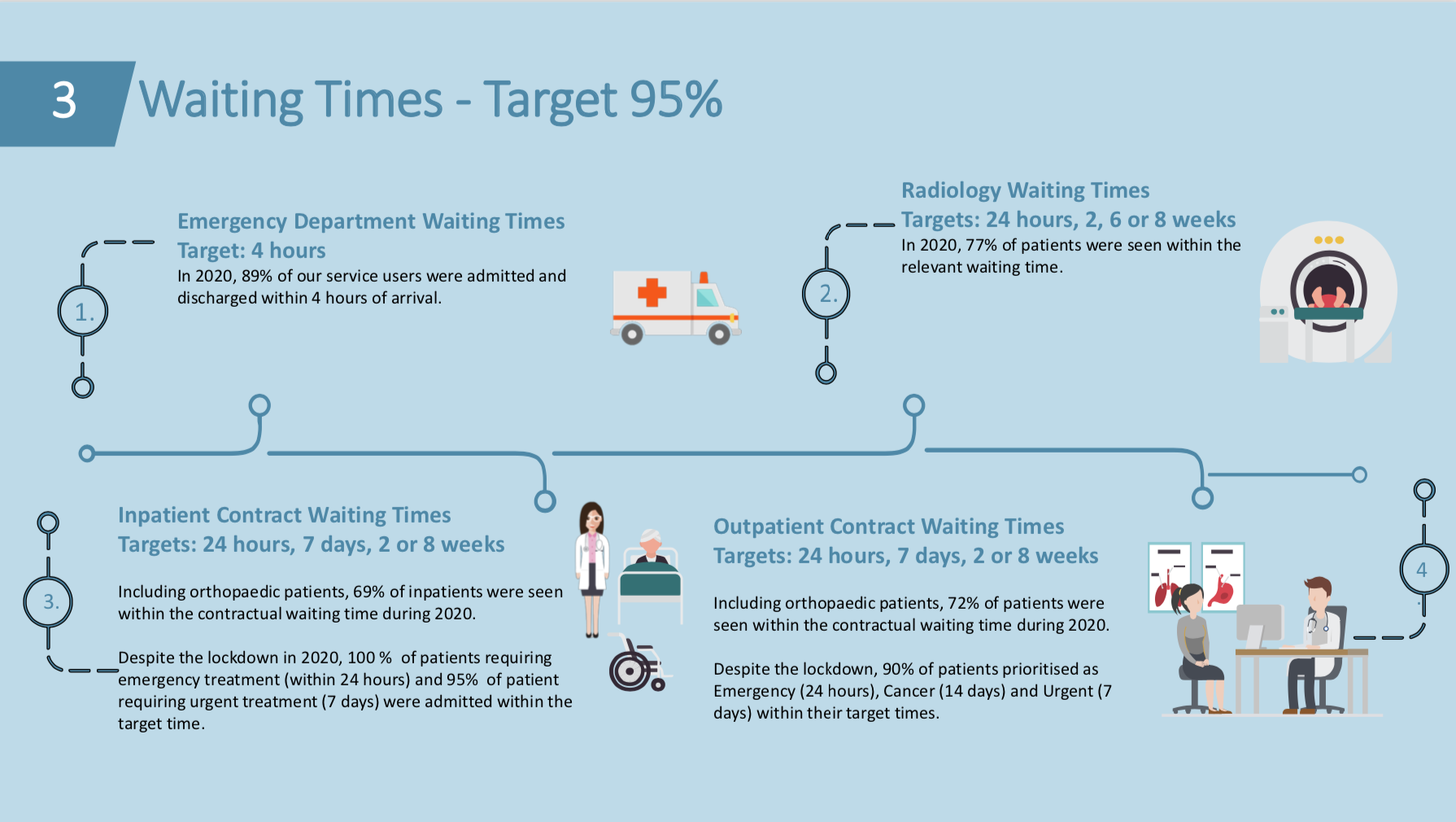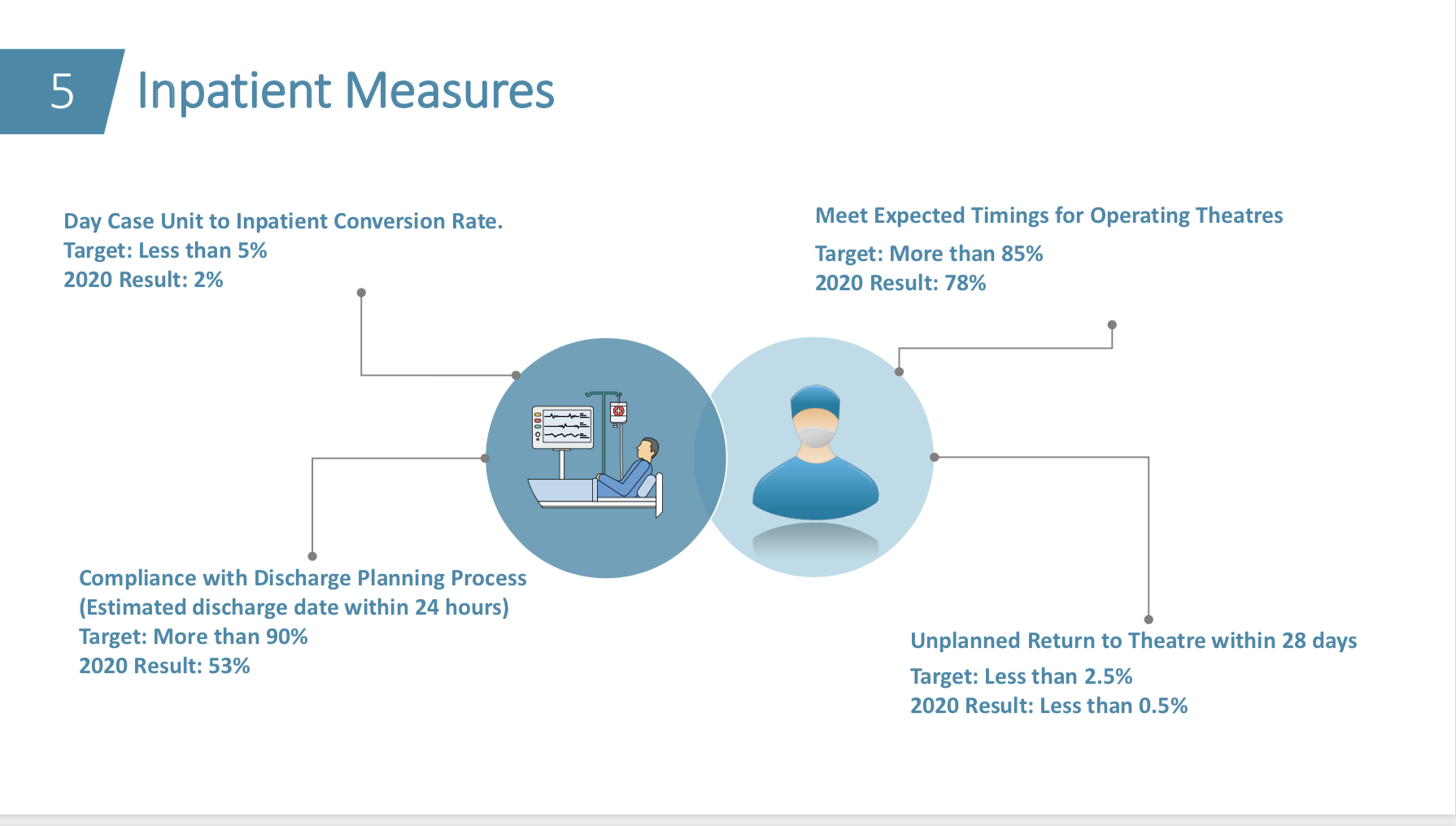

The Medical Specialist Group’s annual report outlines the many challenges caused by the pandemic and lockdown.
While services were stretched and some treatments endured a temporary backlog or were put on hold, medical directors are pleased overall with the year’s performance figures.
Dr Gary Yarwood, MSG Chairman, said: “Despite an exceptionally difficult year in 2020, it is pleasing to see the areas of improvement that have been achieved. Our staff continue to work in partnership with the Committee for Health & Social Care to provide excellent services for the Bailiwick and I am proud of the services our teams achieve.”
The Secondary Healthcare Contract between the MSG and the HSC started in 2018. One requirement is the publishing of KPIs – a measure of how they perform against published targets.

Pictured: Waiting times measured against key performance indicators.
Dr Peter Rabey, HSC Medical Director, said: “The contract we have with the MSG provides some of our most critical services to the public each year. These performance measures provide the public with information and assurance that these services are focussed on quality, safety and are patient-focussed.
“Our response in 2020 to the COVID-19 pandemic had a profound impact on the delivery of health and care service, with all aspects of operations impacted. The need to prioritise staff and resources to protect patients, manage the spread of the virus and support those who became infected was rightly at the forefront of the successful response strategy.”
Early in the pandemic, testing capacity was limited, and turnaround times were slow, with samples having to go to the UK to be tested. Emergency care services had to be maintained and additionally the MSG prioritised provision of cancer patient care. Theatre cases were severely disrupted as all theatre staff had to wear full PPE throughout any procedure and patients had to be recovered in theatre in order to minimize the areas of the hospital exposed to potentially infectious patients. In addition, turnaround times were slow as the operating theatres had to be thoroughly cleaned between patients.
However, during the entire lockdown period, all “Priority 1 and 2” surgical operations were delivered. This work involved the most critical and urgent casework, including cancer responses and trauma treatments.
“Thanks to islanders’ excellent compliance with the lockdown provisions, we came out of lockdown faster than many other jurisdictions, which meant that waiting list times at the end of 2020 were not as bad as they could have been,” the report states.

Pictured: Stats on inpatient measures show that the targets for operations are not currently being met.
The report also states that to manage increased patient demand and to keep pace with what the community needs, HSC is delivering a major Hospital Modernisation Programme which is hoped to start this year. That should provide the facilities, services and capacity needed by the community into the future.
Other findings in the report include:
Missed appointments and short-notice cancellations for both adult and child patients were down on the previous year, although these continue to be a cause of both frustration and extra costs for the HSC and MSG.
Only five out of more than 13,000 hospital admissions suffered a hospital-acquired infection, and all were categorised as “unavoidable”.
Waiting times in the emergency department continued to be skewed by Guernsey not employing junior doctors or having an admissions unit. Enhanced cleaning and other COVID-19 safe practices also contributed to longer patient times in the ED.
Radiology waiting times were below-target, although this was again affected by COVID-19 and a new MRI scanner is soon to come into service.
Outpatient and inpatient waiting times were below target. Specialities with the longest waiting times include orthopaedics, gastroenterology and ENT. However, many clinics were rearranged because of COVID-19 and after the first wave of the pandemic clinics were reorganised, some 97% or routine patients were seen within six months of referral.
The outpatient appointments cancellation rate missed its target, again partly due to the pandemic.
Comments
Comments on this story express the views of the commentator only, not Bailiwick Publishing. We are unable to guarantee the accuracy of any of those comments.